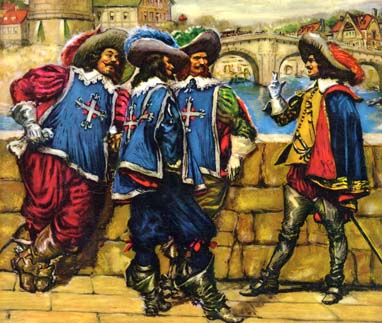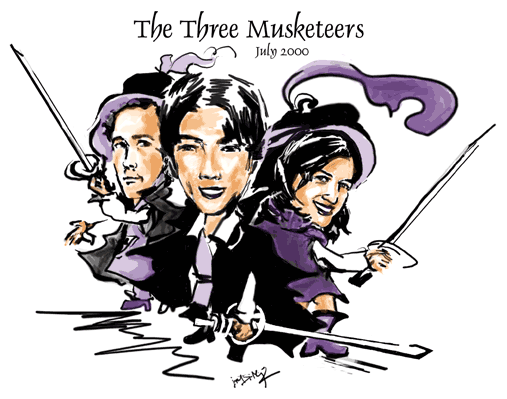The Three
Musketeers (Les Trois Mousquetaires) is a novel by Alexandre Dumas, père. It
recounts the adventures of a young man named d’Artagnan after he leaves home
to become a musketeer. D’Artagnan is not one of the musketeers of the title;
those are his friends Athos, Porthos, and Aramis — inseparable friends who
live by the motto “one for all, all for one” (“un pour tous, tous pour
un”).
The story of
d’Artagnan is continued in Twenty Years After and The Vicomte de Bragelonne.
Those three novels by Dumas are together known as the D’Artagnan Romances.
The Three
Musketeers was first published in serial form in the magazine Le Siècle between
March and July 1844.
The main
character, d’Artagnan, comes from an impoverished noble family of Gascony. On
the first Monday of April 1625 (which would be April 7), he leaves home for
Paris to fulfill his greatest dream: becoming a Musketeer of the Guard.
Fortunately, his Father knows the Captain of the Company of Musketeers (also a
Gascon) and has written a letter of introduction. On his journey, he begins
arguing with a mysterious man with a black cape and a scar on his face.
Assaulted by the servants of the inn where the argument took place, d’Artagnan
is left broken and bleeding while the mysterious stranger leaves. When
d’Artagnan regains consciousness, he realizes that the gentleman has stolen
his letter. The innkeeper manages to get his hands on much of d’Artagnan’s
money as he recuperates as well.
In Paris,
d’Artagnan goes straight to the hangout of the Musketeers, but without his
father’s letter he is received somewhat coldly. The same day, d’Artagnan is
challenged to a duel by three musketeers: Athos, Porthos, and Aramis, who happen
to be very close friends and who encounter d’Artagnan one after the other. The
four men meet and, d’Artagnan begins to fight Athos (the first challenger).
They are interrupted by the Cardinal Richelieu’s guards, who threaten to
arrest them because duels are forbidden by royal decree. The three musketeers
and d’Artagnan unite to defeat the Cardinal’s guards. In this manner, the
young Gascon earns the respect and friendship of Athos, Porthos and Aramis, and
becomes a soldier in the Royal Guard. This is the first step in becoming a
Musketeer.
After obtaining lodging and hiring a servant (Planchet), he meets his aging landlord’s pretty young wife, Constance Bonacieux, with whom he falls instantly in love. She is dressmaker and confidant to the Queen, Anne of Austria.

Illustration
from The Three Musketeers, Grosset
and Dunlap, 1950,1953,1981
Unhappy in her
marriage with Louis XIII, the Queen flirts with the English Prime Minister, the
Duke of Buckingham. Constance and d’Artagnan help the two meet, and the Queen
presents her lover some diamond jewels originally given to her by her husband
the King. However, Cardinal de Richelieu, informed by his spies of the gift,
persuades the King to invite the Queen to a ball where she would be expected to
wear the diamonds.
D’Artagnan and
his friends leave for London to get the diamonds back from Buckingham. The
voyage is full of dangers set by the Cardinal. Athos, Porthos and Aramis are
badly wounded on the way; only d’Artagnan arrives in England. He retrieves the
jewels and returns them to Queen Anne, just in time to save her facade of honor.
The Cardinal is
impressed enough to invite d’Artagnan to join his own corps, but the lad
passes on this offer out of loyalty to his friends. Since he is not in the
Cardinal’s service, he does not have the Cardinal’s protection, however.
The Cardinal’s
revenge comes swiftly: the next evening, Constance is kidnapped. D’Artagnan
brings his friends back to Paris and tries to find her, but fails. Meanwhile, he
befriends the Count de Winter, an English nobleman who introduces him to his
sister-in-law, Milady de Winter. Despite his love for Constance and his
suspicions that Milady is the Cardinal’s spy, he finds it very hard to resist
her charms. He almost falls into the trap, believing Milady is in love with him,
when he accidentally finds a letter of hers to the one she really loves, the
Count de Wardes. Helped by Milady’s chambermaid Kitty, who is infatuated with
him, d’Artagnan has his revenge: he spends a night with Milady, pretending to
be M. de Wardes in the darkened room, and Milady gives him a sapphire ring as a
token of her love. He admits the truth though, and she tries to slay him with a
dagger. In the struggle, d’Artagnan discovers that Milady has a fleur-de-lis
burned into her shoulder, marking her as a felon. Remembering a story that Athos
had once told him, d’Artagnan suddenly realizes with horror that Milady is
not, as he thought, an English noble lady, but in fact Athos’ wife, whom
everyone thought dead. He now knows that Milady will never forgive him for
having insulted her so dearly, and is relieved when all the King’s Guards are
ordered to La Rochelle where a siege of the Protestant-held town is taking
place.
